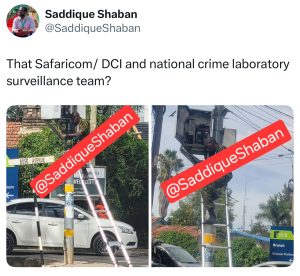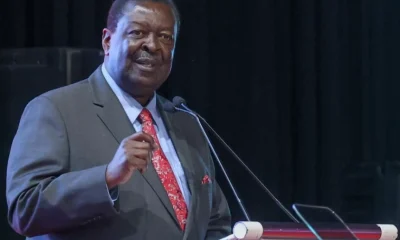A photograph of a uniformed officer working with cables at a suspected Safaricom facility has ignited controversy, with investigative journalist Saddique Shabaan suggesting it evidences a surveillance operation.
His viral post on X, captioned “That Safaricom/DCI and national crime laboratory surveillance team?”, has intensified Kenya’s ongoing debate over the telecom giant’s alleged role in state-sponsored abductions and privacy violations—claims Safaricom has consistently denied.

The image emerges at a critical moment. Safaricom, Kenya’s dominant telecom provider with a 65% market share and 47 million subscribers, faces mounting accusations from human rights organizations and journalists of enabling security agencies to track and apprehend citizens.
The Kenya National Commission on Human Rights (KNCHR) has documented over 80 abductions since the Gen Z protests began in mid-2024, with activists alleging Safaricom’s data-sharing practices facilitate these operations.
Shabaan’s photograph amplifies concerns that began when Safaricom built a KES 14.9 billion police surveillance system in 2015, connecting 195 stations in Nairobi and Mombasa with advanced CCTV, facial recognition, and tracking technology.

Costing taxpayers Sh1 billion annually, the system represents a technological advancement in crime prevention to supporters—but raises serious privacy concerns for others.
Critics, including the Kenya Human Rights Commission (KHRC), Katiba Institute, and Muslims for Human Rights (MUHURI), allege that Safaricom provides call records and location data without court orders, potentially enabling extrajudicial actions.
Scrutiny intensified last October when Nation Media Group (NMG) journalists Namir Shabibi and Claire Lauterbach published an investigative report alleging Safaricom’s close relationship with security agencies facilitated such abuses.
Subsequent reporting by Daniel Ogetta, Kepha Muiruri, and Evans Jaola maintained pressure on the company.
In response, Safaricom filed a complaint against NMG with the Media Council of Kenya’s Complaints Commission, claiming they weren’t given opportunity to comment—an assertion that KHRC and allied organizations describe as “demonstrably false,” noting that 18 pages of allegations were sent to Safaricom before publication.
On April 3, 2025, the Commission agreed to proceed with a full hearing, a decision criticized by human rights groups as potentially threatening media freedom.
“Safaricom is employing a Strategic Lawsuit Against Public Participation (SLAPP) to silence journalists exposing concerning practices,” their joint statement read, arguing that the telecom is avoiding accountability rather than addressing specific allegations—such as claims of manipulated call data in disappearance cases.
They also highlighted a separate lawsuit against journalist Robert Wanjala Kituyi, whom Safaricom is suing for requesting information about police data requests between June and October 2024.
Safaricom responded in October 2024 with a firm denial of privacy violations, maintaining that it only shares data with proper judicial authorization.
However, the company has not directly addressed specific cases—such as Trevor Ndwiga’s 2022 abduction, where discrepancies in call records were reported, or the 2017 disappearance of two South Sudanese activists allegedly linked to Safaricom data.
The company’s November 2024 advertising boycott against NMG, which Reporters Without Borders condemned as a “pressure campaign,” has further fueled public skepticism.
The government, which holds a 35% stake in Safaricom alongside Vodacom and Vodafone (40%) and retail investors (25%), has been criticized for its response.
Majority Leader Kimani Ichungwah has dismissed abduction reports as staged, despite ongoing reports of police actions against protesters.
As the Media Council hearing approaches, human rights organizations warn that rejecting Safaricom’s complaint is essential to preserving press freedom.
For now, many Kenyans continue to question Safaricom’s role: telecommunications provider or component in a surveillance apparatus? The evidence, according to these organizations, can be found in NMG’s reporting—and public demand for answers persists.
Kenya Insights allows guest blogging, if you want to be published on Kenya’s most authoritative and accurate blog, have an expose, news TIPS, story angles, human interest stories, drop us an email on [email protected] or via Telegram

 News2 weeks ago
News2 weeks ago
 News4 days ago
News4 days ago
 Investigations2 weeks ago
Investigations2 weeks ago
 News5 days ago
News5 days ago
 Politics1 week ago
Politics1 week ago
 Investigations1 week ago
Investigations1 week ago
 News2 weeks ago
News2 weeks ago
 Investigations1 week ago
Investigations1 week ago





























